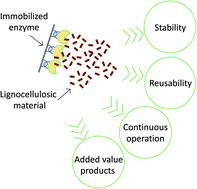Enzyme immobilization as a strategy towards efficient and sustainable lignocellulosic biomass conversion into chemicals and biofuels: current status and perspectives
Abstract
Environmental issues have led to the urgent necessity of research to focus on fossil fuel dependency detachment in the near future. Under the biorefinery concept, enzymatic hydrolysis is a key bioprocess for lignocellulosic biomass conversion into biofuels and bioproducts. Even though taking place under milder conditions and without the use of hazardous chemicals compared, for example, with acid hydrolysis, the use of enzymes significantly increases the cost of the process. In this sense, enzyme immobilization has emerged as an important strategy to reduce enzyme costs as it often enhances enzyme stability, while also allowing an easy recovery and reuse. This review discusses the advantages and limitations of hydrolytic lignocellulosic enzyme immobilization, with special focus on the hydrolysis of different lignocellulosic biomasses. Enzyme immobilization is a very well-studied topic, however, there is a lack of studies on the enzymatic hydrolysis of real LCM substrates and the enzyme–substrate (biomass) interactions, thus limiting the knowledge transition for the implementation of this strategy within the context of second generation biorefineries. As such, this state-of the-art compiles recent studies reporting the use of immobilized lignocellulosic enzymes and contributes to shed light on the main knowledge gaps and specific hurdles of these processes, in order to be able to take full advantage of the benefits of enzyme immobilization and boost the feasibility and attractiveness of biorefineries.

- This article is part of the themed collection: Sustainable Energy and Fuels Recent Review Articles


 Please wait while we load your content...
Please wait while we load your content...